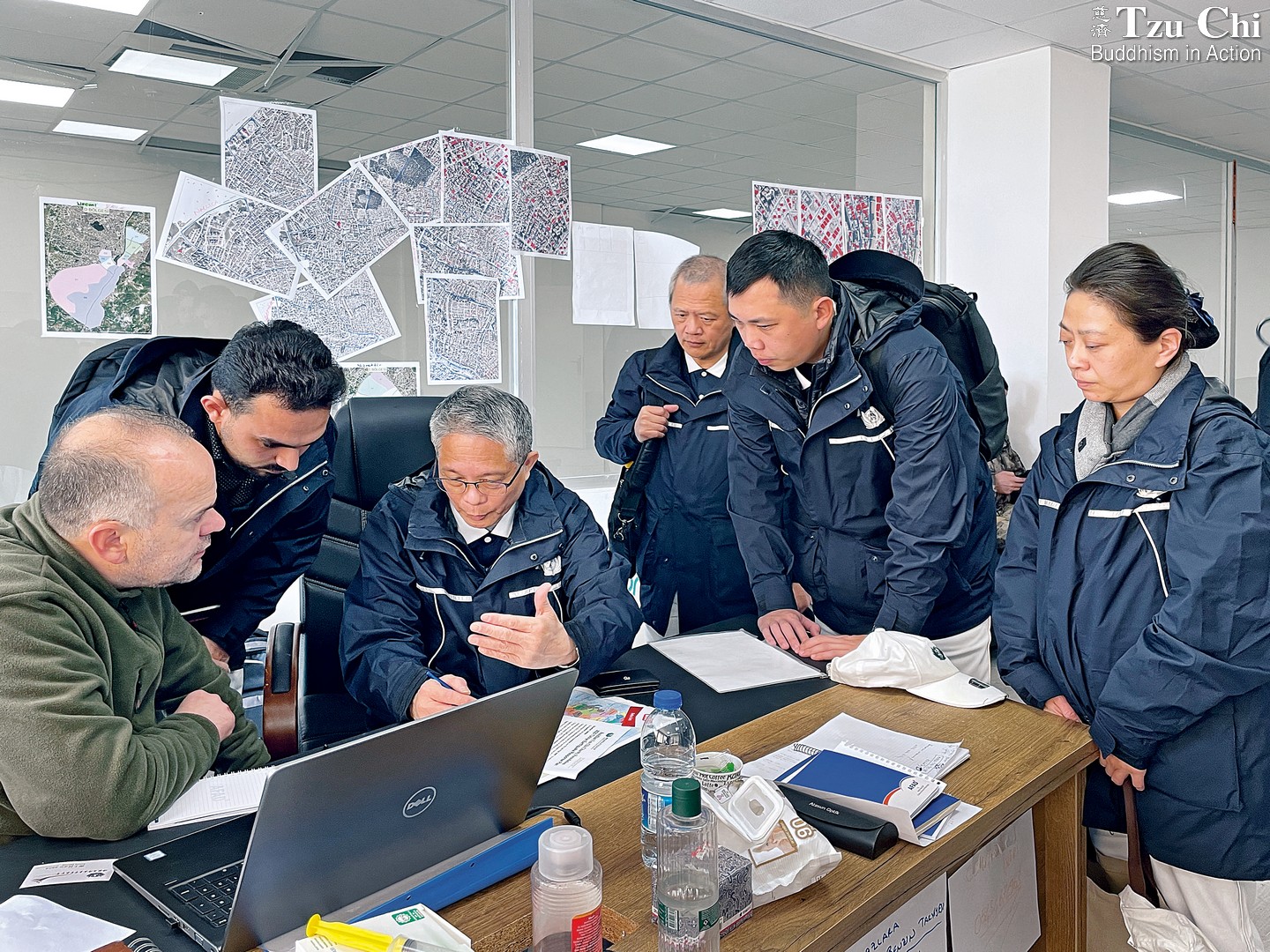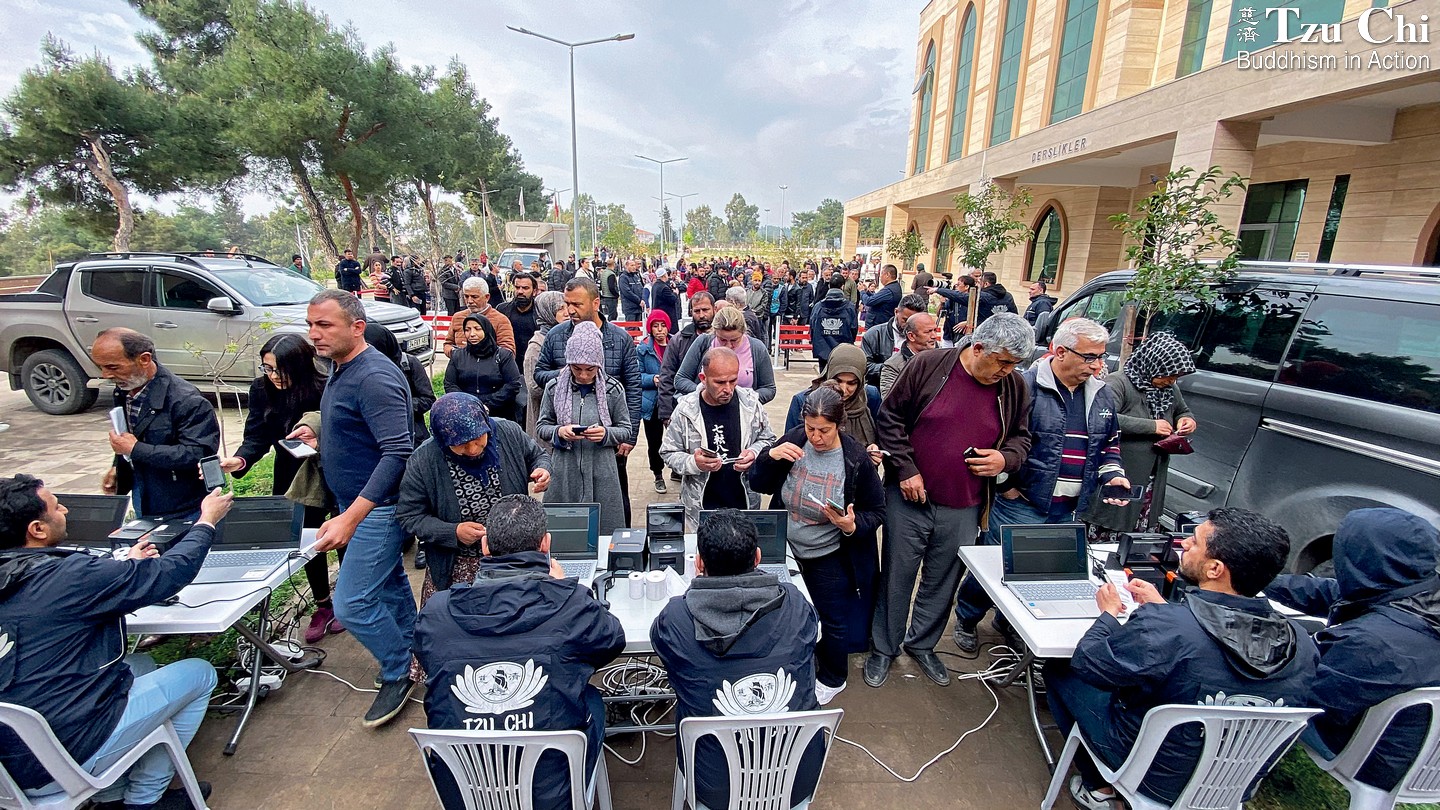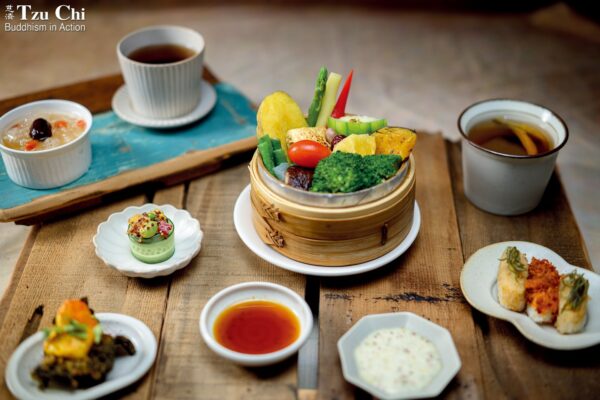By Yeh Tzu-hao
Compiled and translated by Wu Hsiao-ting
After the Türkiye-Syria earthquakes, Tzu Chi provided blankets, scarves, and gift cards to help survivors weather the crisis. The foundation has also initiated mid- and long-term assistance efforts, with a focus on education and medicine.

Simon Shyong (third from left) and other members of a Tzu Chi relief team discuss aid distribution issues with Turkish government officials in a Disaster and Emergency Management Presidency office in Hatay Province, southern Türkiye.
Jessica Yang
“Should a smaller amount be distributed to each person so more people could benefit?” said a Turkish government official to a Tzu Chi team during a disaster relief coordination meeting.
“But the recipients we are targeting are those who are most in need!” responded a Tzu Chi volunteer.
During the meeting, the Tzu Chi team reiterated the foundation’s principles of distribution, which were based on instructions from Dharma Master Cheng Yen. Those principles were to make a meaningful impact on the beneficiaries and to directly and respectfully assist those who were truly in need. In addition to blankets and scarves, Tzu Chi was offering gift cards to affected households based on family size. “The amount on the gift cards should be enough to cover two months of basic living expenses for each recipient household,” said Simon Shyong (熊士民), leader of the Tzu Chi team.
After the quakes in February, Tzu Chi volunteers worked tirelessly to get aid into the hands of victims. They hoped to provide assistance to as many families as possible before the start of Ramadan, the Islamic month of fasting, which was beginning on March 23 in Türkiye this year. Despite losing their homes and facing challenges in their daily lives, the majority of the affected individuals were still observing Ramadan by not eating or drinking during daylight hours. This act of self-purification would take on an additional meaning this year, as quake survivors prayed for blessings for their deceased or injured loved ones. However, it would also bring additional physical and mental challenges as survivors faced the difficult time after the devastating tremors. Although the nights in March and April were not too cold, significant temperature differences between day and night made supplies such as blankets essential.
With Ramadan quickly approaching, Tzu Chi volunteers stepped up their efforts to carry out large-scale distributions in areas that were heavily impacted by the tremors. Their hard work paid off: they were able to provide aid to 30,000 families before the start of the holy month. By the end of March, they had reached nearly 39,000 families and concluded the emergency phase of Tzu Chi’s relief efforts, benefiting more than 180,000 people in the provinces of Hatay, Gaziantep, and Şanlıurfa.
Mid- and long-term aid
Now that the emergency relief phase has ended, Tzu Chi has shifted its focus to medium- and long-term reconstruction efforts. The Turkish government has responded to the dire situation of over a million people left homeless by promptly deploying a significant number of shipping container houses to provide temporary shelter for those who were living in tents. They are also planning to construct hundreds of thousands of new houses that residents can purchase with government assistance in the form of loans.
Rebuilding homes entails various considerations, including ownership, loans, fairness, and more. It requires more time for coordination among the Turkish government, people in the disaster zone, and the aid organizations interested in the reconstruction efforts. Due to the complexity of rebuilding homes, Tzu Chi has given priority to assessing its involvement in the reconstruction of schools.
Elementary, middle, and high schools in Türkiye all follow a four-year program. Most elementary and secondary schools have eight classrooms per grade, with an average of 30 students per class. Thus, constructing a new school requires building at least 32 regular classrooms, along with offices, specialized classrooms, and other facilities, to accommodate about 960 students and teachers.
However, numerous buildings are requiring reconstruction in the quake-stricken area. Such a high demand for labor and building materials has led to a significant increase in construction costs, twice as much as pre-disaster levels. As a result, reconstruction efforts in Türkiye face challenges in terms of labor, building materials, and other logistical aspects. Despite these obstacles, Tzu Chi remains unwavering in its commitment to constructing earthquake-resistant structures, just like those built during Project Hope, a school reconstruction project initiated after Taiwan’s 9/21 earthquake in 1999.
Lin Min-chao (林敏朝), director of Tzu Chi’s Construction Department, remarked, “Given that the local area is a seismic zone, ensuring the safety of structures is of paramount importance.” He had witnessed the heartbreaking scene of rubble-filled areas in Türkiye’s quake-stricken region and taken it as a lesson. He emphasized that if Tzu Chi’s reconstruction efforts in Türkiye can proceed, “we will not only comply with Türkiye’s building regulations, but also reference Taiwan’s high standards for construction norms.” The director explained after the 9/21 earthquake in 1999, the revised Taiwanese building code has become one of the strictest building standards in the world.
Apart from actively assessing and planning for its Turkish version of Project Hope, Tzu Chi has also signed a cooperative agreement with Doctors of the World Türkiye to support the organization’s medical relief efforts in the quake-stricken areas of Syria. Doctors of the World, also known as Médecins du Monde, is one of the very few organizations that are able to provide medical assistance in the Syrian disaster zone. Through their joint effort, Tzu Chi and the organization aim to provide medical aid to the people of Syria in the disaster area for a year, including trauma care, OB/GYN services, and counseling for post-disaster trauma.
In light of the challenges faced by the Taiwan-Reyhanli Center for World Citizens in Reyhanli, Hatay Province, which has provided refuge to a significant number of earthquake survivors but is grappling with issues arising from extensive damage to local water and electricity infrastructures, Tzu Chi has contacted solar energy companies with the intention of donating solar power generation equipment to the center. This initiative seeks to enhance the center’s disaster resilience through the use of sustainable green energy.

Following the earthquakes in Türkiye and Syria, Tzu Chi conducted 40 distributions during the emergency relief period, helping over 180,000 people.
Abdulrahman Hritani
Resilient life force
While visiting the quake zone in southern Türkiye, Tzu Chi volunteers witnessed firsthand the profound psychological impact of the strong tremors. At the same time, they observed the resilience and vitality of life that remained unbroken amidst the devastation.
For example, a 25-year-old preschool teacher had been visiting a temporary daycare center in the severely affected town of Nurdağı every day to help care for the young children there. She said, “Every child here has suffered emotional wounds due to the earthquakes; they require patient companionship.” Despite facing challenging conditions, such as spending nights in a tent, she chose not to seek refuge with relatives in unaffected areas, but instead stayed in her hometown where she was born and raised. “This place is my home,” she firmly stated. “If we don’t help ourselves, who will?”
Deveci, another local resident, extended his appreciation to Tzu Chi volunteers by saying, “For me, the most valuable thing is the support you have brought from Taiwan. Mutual help and love among humans are so beautiful. Thank you for bringing such commendable values to us.”

 Zoom in picture)
Zoom in picture)

